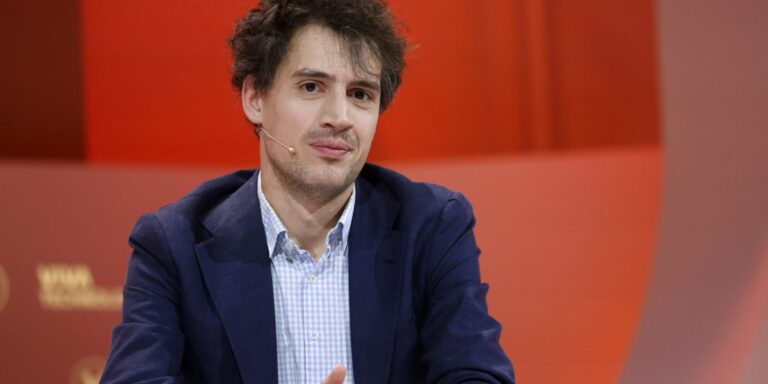The dramatic new age story of a college student striking it rich with a billion-dollar idea shortly after donning his graduation gown has been the American Dream for much of the 21st century.
While Europe lagged behind in the tech boom, the still-dominant companies Google, Meta and Microsoft had their founders begin their journeys in dorm rooms at Harvard and Stanford.
But some exciting European startups are proving they won’t be left behind in the AI revolution, as more capital is currently flowing into Paris than any other city on the continent.
French AI startups are the best-funded among their European and Israeli peers, according to Dealroom data analysed by venture capital fund Accel.
Firms including Mistral, Oukine and Hugging Face have helped French AI startups raise the equivalent of $2.3 billion in funding to fuel their fast-growing businesses, more than rivals in other European centres such as Britain and Germany.
The data confirms that Paris universities are a source of new technological talent for France.
Parisian Studies
Arthur Mensch, the 31-year-old CEO of AI unicorn Mistral, may be the most exciting man in France’s burgeoning tech industry, having overseen the massive language-modeling group’s meteoric rise to a market capitalization of $6 billion.
But like many other French founders, he started out at university in Paris.
About 57% of the French founders are from École Polytechnique, a science and engineering-focused university based in Palaiseau, a southern suburb of Paris.
Mensch is one of them, having studied applied mathematics and computer science at the university from 2011 to 2015.
According to Dominique Rossan, president of the Ecole Polytechnique, only a small proportion of students who walk through the university gates on their first day know what they want to do with their lives.
“We push students out of their comfort zones, encourage them to try new subjects and discover new areas of science. Just as the field of engineering is vast, so are the student profiles, interests and inclinations towards particular topics,” Rossin told Fortune.
“Yet we can say that successful founders often share some of the characteristics we try to foster at École Polytechnique: a good team spirit, strong problem-solving skills and a great deal of perseverance and dynamism.”
Students at the university can also take courses in the humanities and social sciences to broaden their horizons, which will become increasingly important as AI permeates every field.
Mistral’s co-founder is also a former Google DeepMind employee, and 11% of the founders analyzed by Accel started their careers at Google, putting them at a similar level of experience.
The Pierre and Marie Curie campus of the Sorbonne and Paris Telecom are other major universities in the capital where today’s founders gained their experience.
Meanwhile, the Ecole Normale Supérieure is a school where tech protégés go to thrive. Around 29% of French founders have their work experience there, ahead of Stanford and MIT in the US and AI giants like Google and Facebook. Mistral’s Mensch earned his doctorate at the university in Paris’ 5th arrondissement before joining Google.
The drive to acquire AI capital is catching on across Europe, and while French startups have received the most funding, the UK is home to the most AI startups out of the 221 identified by Dealroom.
Universities become founder factories
European universities haven’t always been the home of founders of multi-billion-dollar companies, and entrepreneurs have often pointed to a cultural mismatch that means innovation rarely emerges within the walls of universities on the eastern side of the Atlantic.
But thanks to the AI boom, that’s starting to change.
Harry Nellis, a partner at Accel, has been investing in Europe’s tech ecosystem for two decades and said the landscape has “changed dramatically” in recent years.
He values ”founder factories” – startups spawning new startups.
“Initially, we were investing in entrepreneurs from large French companies who had no prior investment experience.
“The result is that you’re going to have to reinvent the wheel a lot of times,” Nellis said.
Now, Europe’s mature ecosystem is becoming home to several of these founder factories, most importantly universities, with Meta establishing its Fundamental AI Research (FAIR) hub in Paris in 2015.
Because AI is based on deep tech and foundational models, it’s not surprising that 38% of European founders held positions in academia, Nellis said.
“This is something that’s really new to the AI wave. It wasn’t the case with the e-commerce wave, for example, or the enterprise software wave. This is something that’s really unique to AI,” he points out.
École Polytechnique’s Rossin agreed, adding that the success of alumni provides current students with unique networking opportunities.
But a threat looms from France’s relatively chaotic political forces.
President Emmanuel Macron last week called elections that could see either the country’s far-left or far-right take power.
The news sent the French stock market plummeting, with the London bourse regaining its position as Europe’s largest exchange.
That in itself is unsettling, even without recalling Macron’s pro-business stance.
The president has spearheaded the “Choose France” investment campaign that has helped bring in $16 billion to France from tech giants such as Microsoft and Amazon. Any political turmoil in France could lead to a shift in priorities.
But Nélis believes that even a groundbreaking change in France’s ruling class will not be enough to halt France’s hard-won AI dominance.
“I think the AI wave will be so powerful in itself that politics will actually become less important.”


